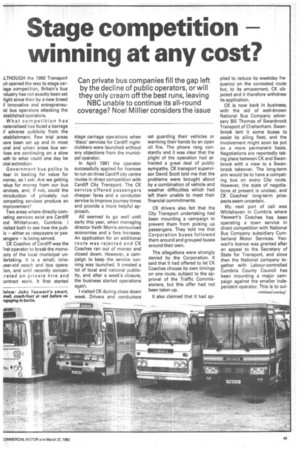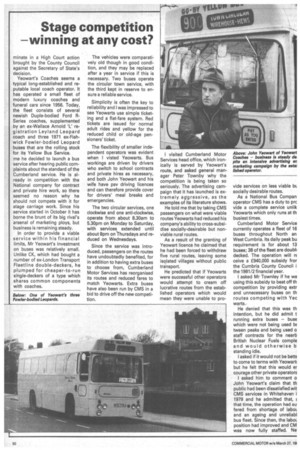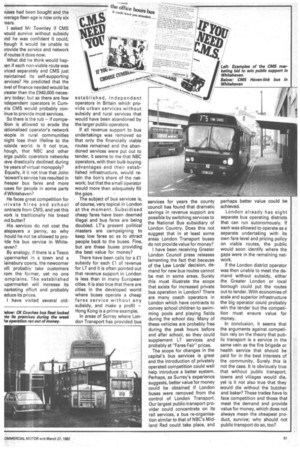Stage competition winning at any cost?
Page 41

Page 42

Page 43

If you've noticed an error in this article please click here to report it so we can fix it.
Can private bus companies fill the gap left by the decline of public operators, or will they only cream off the best runs, leaving NBC unable to continue its all-round coverage? Noel Millier considers the issue
ILTHOUGH the 1980 Transport ct opened the way to stage cariage competition, Britain's bus idustry has not exactly been set light since then by a new breed if innovative and entrepreneuial bus operators attacking the !stablished operators.
What competition has naterialised has faced a barrage if adverse publicity from the istablishment. Few trial areas lave been set up and in most ural and urban areas bus ser'ices are continuing on a slow )ath to what could one day be otal extinction.
Government bus policy is :leer in looking for value for noney, so I ask: Are we getting ralue for money from our bus ;ervices, and, if not, could the ntroduction of privately run ;ompeting services produce an mprovement?
Two areas where directly corn)eting services exist are Cardiff rnd Whitehaven, Cumbria. I risited both to see how the pubic — either as ratepayers or pas;angers — is being served.
CK Coaches of Cardiff was the irst operator to break the monoaoly of the local municipal uniertaking. It is a small, ninefear-old coach and bus opera:ion, and until recently concenrated on private hire and ;ontract work. It first started stage carriage operations when 'disco' services for Cardiff nig htclubbers were launched without any objections from the municipal operator.
In April 1981 the operator successfully applied for licences to run on three Cardiff city centre routes in direct competition with Cardiff City Transport. The CK service offered passengers cheaper fares and a conductor service to improve journey times and provide a more helpful approach.
All seemed to go well until early this year, when managing director Keith Morris announced economies and a fare increase. An application for an additional route was rejected and CK Coaches ran out of money and closed down. However, a campaign to keep the service running was launched. It created a lot of local and national publicity, and after a week's closure, the business started operations again.
I visited CK during close-down week. Drivers and conductors sat guarding their vehicles or warming their hands by an open oil fire. The phone rang constantly and it was clear that the plight of the operation had attracted a great deal of public sympathy. CK transport supervisor David Scott told me that the problems were brought about by a combination of vehicle and weather difficulties which had left them unable to meet their financial commitments.
CK drivers also felt that the City Transport undertaking had been mounting a campaign to prevent them from picking up passengers. They told me that Corporation buses followed them around and grouped buses around their own.
The allegations were strongly denied by the Corporation. It said that it had offered to let CK Coaches choose its own timings on one route, subject to the approval of the Traffic Commissioners, but this offer had not been taken up.
It also claimed that it had ap plied to reduce its weekday frequency on the contested route but, to its amazement, CK objected and it therefore withdrew its application.
CK is now back in business, with the aid of well-known National Bus Company adversary Bill Thomas of Swanbrook Transport of Cheltenham. Swanbrook lent it some buses to assist its ailing fleet, and the involvement might soon be put on a more permanent basis. Negotiations are reportedly taking place between CK and Swanbrook with a view to a Swanbrook takeover. The long-term aim would be to have a competing bus on every City route. However, the state of negotiations at present is unclear, and CK Coaches' long-term prospects seem uncertain.
My, next port of call was Whitehaven in Cumbria where Yeowart's Coaches has been operating a town service in direct competition with National Bus Company subsidiary Cumberland Motor Services. Yeowart's licence was granted after an appeal to the Secretary of State for Transport, and since then the National company together with Labour-controlled Cumbria County Council has been mounting a major campaign against the smaller independent operator. This is to cul minate in a High Court action brought by the County Council against the Secretary of State's decision.
Yeowart's Coaches seems a typical long-established and re putable local coach operator. It has operated a small fleet of modern luxury coaches and funeral cars since 1956. Today, the fleet consists of several newish Duple-bodied Ford R Series coaches, supplemented by an ex-Wallace Arnold 'L' registration Leyland Leopard coach and three 1971 ex-Fishwick Fowler-bodied Leopard buses that are the rolling stock for its Yellow Bus Service.
me he decided to launch a bus service after hearing public com plaints about the standard of the Cumberland service. He is already in competition with the National company for contract and private hire work, so there seemed no reason why he should not compete with it for stage carriage work. Since his service started in October it has borne the brunt of its big rival's arsenal of marketing ploys, but business is remaining steady.
In order to provide a viable service within his financial limits, Mr Yeowart's investment on buses was relatively small.
Unlike CK, which had bought a number of ex-London Transport Fleetline double-deckers, he plumped for cheaper-to-run single-deckers of a type which shares common components with coaches. The vehicles were comparatively old though in good condition, and they may be replaced after a year in service if this is necessary. Two buses operate the circular town service, with the third kept in reserve to ensure a reliable service.
Simplicity is often the key to reliability and I was impressed to see Yeowarts use simple ticketing and a flat-fare system. Red tickets are issued for normal adult rides and yellow for the reduced child or old-age pensioners' ticket.
The flexibility of smaller independent operators was evident when I visted Yeowarts. Bus workings are driven by drivers who switch to school contracts and private hires as necessary, and both John Yeowart and his wife have psv driving licences and can therefore provide cover for drivers' meal breaks and emergencies.
The two circular services, one clockwise and one anti-clockwise, operate from about 8.30am to 5.30pm on Monday to Saturday, with services extended until about 8pm on Thursdays and reduced on Wednesdays.
Since the service was introduced, passengers on the routes have undoubtedly benefited, for in addition to having extra buses to choose from, Cumberland Motor Services has reorganised its routes and reduced fares to match Yeowarts. Extra buses have also been run by CMS in a bid to drive off the new competition. I visited Cumberland Motor Services head office, which ironically is served by Yeowart's route, and asked general manager Peter Townby why the competition is being taken so seriously. The advertising campaign that it has launched is extremely aggressive, as the examples of its literature shows.
He told me that by taking CMS passengers on what were viable routes Yeowarts had reduced his company's ability to cross-subsidise socially-desirable but nonviable rural routes.
As a result of the granting of Yeowart licence he claimed that he had been forced to withdraw five rural routes, leaving some isolated villages without public transport.
He predicted that if Yeowarts were successful other operators would attempt to cream off lucrative routes from the established operators which would mean they were unable to pro vide services on less viable Ix socially desirable routes.
As a National Bus Compan operator CMS has a duty to prc vide a complete service unlik Yeowarts which only runs at th busiest times.
Cumberland Motor Service currently operates a fleet of 16 buses throughout North an West Cumbria. Its daily peak bu requirement is for about 13 buses; 38 of the fleet are doubli decked. The operation will rE ceive a £940,000 subsidy fror the Cumbria County Council i the 198112 financial year.
I asked Mr Townley if he wa using this subsidy to beat off th competition by providing extr and unnecessary buses on th routes competing with Yec warts., He denied that this was th intention, but he did admit t running extra buses — buse which were not being used bt tween peaks and being used o staff contracts for the nearb British Nuclear Fuels comple and would otherwise b standing idle.
I asked if it would not be bettE to come to terms with Yeowart but he felt that this would er courage other private operators I asked him to comment o John Yeowart's claim that th public had been dissatisfied wit CMS services in Whitehaven i 1979 and he admitted that, that time, the operation had su fered from shortage of labok and an ageing and unreliabl bus fleet. Since then, the labok position had improved and CM was now fully staffed. Ne )uses had been bought and the rverage fleet-age is now only six rears.
I asked Mr Townley if CMS vould survive without subsidy md he was confident it could, hough it would be unable to novide the service and network if routes it does now.
What did he think would hap)en if each non-viable route was )riced separately and CMS just naintained its self-supporting ervices? He predicted that the evel of finance needed would be ireater than the £940,000 necesary today; but as there are few ndependent operators in Cum}ria CMS would probably coninue to provide most services.
So there is the rub — if compeition is allowed to erode the rationalised operator's network reople in rural communities night lose their lifeline to the rutside world. Is it not true, hough, that NBC and other arge public operators networks tave drastically declined during he years of virtual monopoly? Equally, it it not true that John (eowart's service has resulted in :heaper bus fares and more ruses for people in some parts
Whitehaven?
He faces great competition for rrivate hires and school ;ontracts from CMS, and yet this vork is traditionally his bread Ind butter?
His services do not cost the atepayers a penny, so why ;hould he not be allowed to proide his bus service in Whiteraven?
By analogy, if there is a Tesco ;upermarket in a town and a iainsbury opens, the newcomer vill probably take customers rom the former, yet no one ;omplains. The established :upermarket will increase its narketing effort and probably educe its prices.
I have visited several old established, independent operators in Britain which provide urban services without subsidy and rural services that would have been abandoned by the larger public operators.
If all revenue support to bus undertakings was removed so that only the financially viable routes remained and the abandoned services were put out to tender, it seems to me that NBC operators, with their bulk-buying advantages and their established infrastructure, would re tain the lion's share of the network; but that the small operator would more than adequately fill the gaps.
The subject of bus services is, of course, very topical in London at the moment. Subsidised cheap fares have been deemed illegal and bus fares are being doubled. LT's present political masters are campaigning to keep low fares so as to attract people back to the buses. Fine, but are these buses providing the best value for money? There have been calls for a £1 subsidy for each El of revenue for LT and it is often pointed out that revenue support in London is less than in many European cities. It is also true that there are cities in the developed world where buses operate a cheap fares service without any subsidy, and make a profit — Hong Kong is a prime example.
In areas of Surrey where London Transport has provided bus services for years the county council has found that dramatic savings in revenue support are possible by switching services to the National Bus subsidiary of London Country. Does this not suggest that in at least some areas London Transport buses do not provide value for money?
I have been receiving Greater London Council press releases lamenting the fact that because of the Law Lords' decision, demand for new bus routes cannot be met in some areas. Surely this must illustrate the scope that exists for increased private bus operation in London? There are many coach operators in London which have contracts to convey school children to swimming pools and playing fields during the school day. Many of these vehicles are probably free during the peak hours before and after school, so they could supplement LT services and probably at "Fares Fair" prices. The scope for changes in the capital's bus services is great and the introduction of privately operated competition could well help introduce a better system. Perhaps, as Surrey's experience suggests, better value for money could be obtained if London buses were removed from the control of London Transport. Our largest public-transport provider could concentrate on its rail services, a bus re-organisation similar to that of NBC's Midland Red could take place, and perhaps better value could be achieved.
London already has eight separate bus operating districts that can run autonomously. If each was allowed to operate as a separate undertaking with its own fare level and pricing policy on viable routes, the public would soon identify where the gaps were in the remaining network.
If the London district operator was then unable to meet the demand without subsidy, either the Greater London or local borough could put the routes out to tender. With economies of scale and superior infrastructure the big operator could probably win the tender but the competition must ensure value for money.
In conclusion, it seems that the arguments against competi tion rely on the theory that pub lic transport is a service in the same vein as the fire brigade or health service that should be paid for in the best interests of the community. Surely this is not the case. It is obviously true that without public transport, towns and villages would die, yet is it not also true that they would die without the butcher and baker? These trades have to face competition and those that meet the demand and provide value for money, which does not always mean the cheapest product, survive; why should not public transport do so, too?


















































